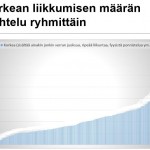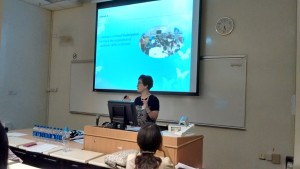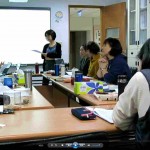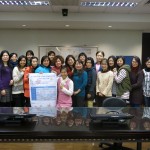Our 2015 data collection has been successful. Even in international comparison the project is unique. We have made more than 100,000 observations and we will merge children’s data, learning environment observations etc. with this data to get a full-bodied picture of ECEC. Now we seek to tighten the progressive feedback into a real-time feedback system. This means that we are attempting to change the cycle of data collection over the past five years to a continuous and established feedback for development. We are attempting to work out the details with the municipalities during the spring of 2016. By using careful sampling and online servers we plan to follow real-time changes. Our purpose is to tighten the integration between planning and evaluation to facilitate data-driven decisions.
Category Archives: Finland
Online progressive feedback in ECE
 In a meeting with the participating municipalities in Finland 3rd December in Vantaa, we discussed about the needs and interests to enhance ECE in each municipality. The municipalities situation, resources and interests are versatile. Our task is to integrate these interests to deepen the online developmental feedback. The purpose is 1) to enhance municipalities’ possibilities to get essential feedback and impact its collection, 2) to enhance the tools and possibilities for online progressive feedback, 3) to connect the feedback with ECE development and 4) to steer ECE development based on valid and real-time understanding. In December 2015 the municipalities get a proposition for the practical issues of feedback. In the next meeting 26th February 2016 we go through the questions and propositions evoked by the proposition. We aim to make the decision about starting progressive feedback in April 2016.
In a meeting with the participating municipalities in Finland 3rd December in Vantaa, we discussed about the needs and interests to enhance ECE in each municipality. The municipalities situation, resources and interests are versatile. Our task is to integrate these interests to deepen the online developmental feedback. The purpose is 1) to enhance municipalities’ possibilities to get essential feedback and impact its collection, 2) to enhance the tools and possibilities for online progressive feedback, 3) to connect the feedback with ECE development and 4) to steer ECE development based on valid and real-time understanding. In December 2015 the municipalities get a proposition for the practical issues of feedback. In the next meeting 26th February 2016 we go through the questions and propositions evoked by the proposition. We aim to make the decision about starting progressive feedback in April 2016.
Just as an example, we can keep up with the variety of children’ mean physical activity in different groups (see the figure above) and study the effects of different enhancements.
Research instruments
We have used several different instruments in our data collection. Several of them we have produced by ourselves (the observation instrument includes involvement scale developed by Laevers 1994). According to the principles of open access we provide them for viewing for the research community. However, the copyright of the instruments belongs to Orientation project, which is directed by Jyrki Reunamo. If you are interested to use the instruments in your research, please contact Jyrki Reunamo at the University of Helsinki.
- Observation by systematic sampling
- Child evaluation
- Learning environment evaluation
- Leadership evaluation
In addition to the instruments described above, we have used tests for reading and writing readiness, math skills, creativity, balance skills, motor skills, stress level testing (cortisol and alpha amylasis) and physical activity monitoring with Polar activity monitors. The original instruments of Observation and Child Evaluation were developed in 1997 (see Reunamo 2007). They were further developed with the help of the Taiwanese team (especially Hui-Chun Lee, Li-Chen Wang and Rosalind Wu, see https://blogs.helsinki.fi/orientate/taiwanese-team/). The original learning environment was developed in 2004 based on the City of Helsinki data (thank to Seppo Sarras) and enhanced during several rounds of quality evaluation with the help of the municipality participants (especially Merja Kivistö, Helena Nurmi, Taija Pölkki, Heli Söderqvist, Kati Timo, Merja Hietala, Marita Käyhkö, Petra Salomaa and Vesa Joronen) between years 2010-2015. The Leadership evaluation was developed in 2014 with the help of Marja-Liisa Akselin and Ulla Soukainen (thank you for Timo Järvensivu).
Funding for Pedagogical documentation
 Kati Rintakorpi has received a grant from the Ebeneser-foundation (Siiri Valli’s grant) for 8000 euro for the finishing touches of her dissertation. Kati studies the benefits and challenges of pedagogical documentation in early years. Her last dissertation article is based on Orientation project data. How is pedagogical documentation connected with the everyday activities of the children? What are the connections to the learning environment? What kind of skills and tendencies does pedagogical documentation relate to? Congratulations to Kati!
Kati Rintakorpi has received a grant from the Ebeneser-foundation (Siiri Valli’s grant) for 8000 euro for the finishing touches of her dissertation. Kati studies the benefits and challenges of pedagogical documentation in early years. Her last dissertation article is based on Orientation project data. How is pedagogical documentation connected with the everyday activities of the children? What are the connections to the learning environment? What kind of skills and tendencies does pedagogical documentation relate to? Congratulations to Kati!
Bullying and learning
Our article based on Orientation project data has been accepted for publication in the series Contemporary Perspectives in Early Childhood Education http://www.infoagepub.com/series/Contemporary-Perspectives-in-Early-Childhood-Education. The series is globally perhaps the most important yearbook on Early Childhood Education. The publication is a major recognition of the work we are doing in our project. In the article we study bullying from the perspective of learning, which is a new opening in the study of bullying. Learning often helps to process bullying, but in can also result in confrontation, withdrawness or attempt to accept the bullying as a fact. It is also possible that the child learns nothing in the bullying situation, which means that nothing changes. Luckily, as children grow, the bullied child gets perspective and agency to process the situation, but unfortunately some children face a dead end. Article info: Reunamo, J., Ko, J., Cheng, D., Lee, H-C., Wang, L-C. & Salminen, E. (In print). Openness and agency as strategies on addressing bullying. In O. Saracho (Ed.) Contemporary research on bullying in early childhood education. IAP Publishing: USA.
QCCI conference
At the 2015 Quality Childhood Conference International (QCCI) at 19th June in Hong Kong, an Orientation project symposium was organized. Presenters from Hong Kong, Finland and Taiwan described the project results. In the picture conference chair Doris Cheng presents the differences in children’s orientations at play-based and academic preschools in Hong Kong. The presentations were:
- Reunamo, J. T.: Orientation project: Studying the impact of children’s views in early years
- Lee, H-C., Wang, L-C. & Shih, S-C. Involvement of child learning- Empirical findings in Finland and Taiwan
- Cheng, D. Orientation Project on children’s Views
- Ko, J. Orientation projects in Hong Kong (2) – Does social orientation affect children’s school readiness?
- Chen, H-H. Scaffolded play and learning
- Julienne Pek: Orientation project in Singapore
The conference was also a great place for networking and synchronization of the project. Special thanks for Doris Cheng for the opportunity.
Orientation project symposium at QCCI conference in Hong Kong
Orientation project team will present some of the empirical results of the project at the 2015 Quality Childhood Conference International (QCCI) symposium. The conference takes place at the Hong Kong Institute of Education. The research results will be from Finland, Hong Kong, Singapore and Taiwan.
The conference theme is Enhancing Quality Childhood Education. Check out the conference website at http://www.ied.edu.hk/qcci/. See you at the conference!
Observation training in Taiwan
In Taiwan the observation is from September to December 2015. In every country the observation training is based on same video examples, which have been coded in a similar way in Finland in August 2014. Finnish and Taiwanese researchers sat long hours at the same table looking at the same videos working for a shared understanding of the observed items. With this arrangement we made sure that the researchers in Finland and Taiwan could see the situations in a similar way. Then we use these definitions in the observation training. With this arrangement we seek to make the comparison across countries as accurate as possible. The observers see the same activities and discuss the same definitions. The picture on the left is from the Chung Gung University training for the New Taipei City observers. The picture on the right is from the training in Eastern Taiwan. Click on the pictures to see them larger!
Orientation project in Xinhuanet
Xinhuanet is a leading news media in China. Xinhuanet published an interview about Orientation project that considers the connections between learning, well-being and physical activity. In the interview the importance of wholesome development is emphasized. Hopefully the interview instigates a discussion! You can read the interview here.
Children’s fears in Finnish day care and preschool
Heli Soderqvist has just finished her graduate thesis on the Orientation project data about children’s fears. The children were interviewed by their parents. For the question Are you afraid in day care? answered 3434 children. In average the children were not afraid and they liked to be in day care. For the additional open question What are you afraid in day care? answered 1095 children. These descriptions by children themselves open up a unique view on the everyday in day care and preschool. Unfortunately, only the abstract is in English! Fortunately, Google translate seems to work well with the text 🙂 Take a look at Heli’s work here. Discuss children’s answers with the children of your group of with your own children!
And note that there are a lot of interesting graduate thesis presented in here!


